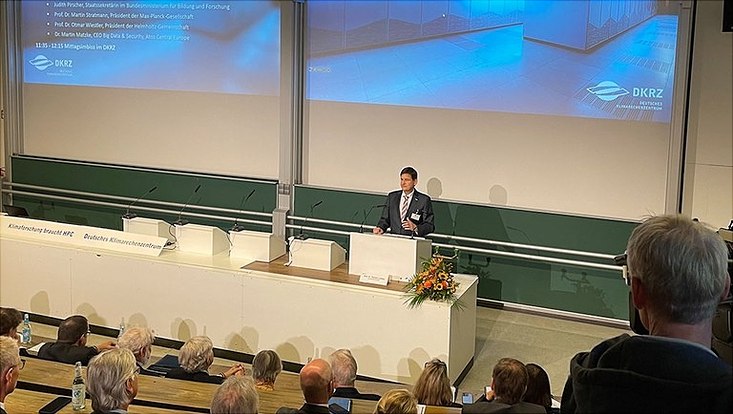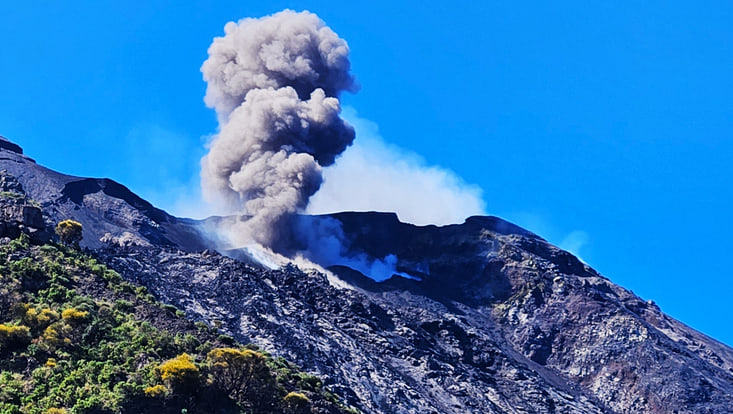Supercomputer "Levante" was inaugurated at DKRZ
23 September 2022, by Deutsches Klimarechenzentrum (DKRZ)

Photo: DKRZ
The new supercomputer Levante was inaugurated on September, 22, 2022 at DKRZ with high-ranking representatives from politics and science. The welcoming speeches were followed by two panel discussions on the challenges of climate research, which highlighted Hamburg's excellent reputation as a climate research location.
"Today we are showing: Climate research in Germany is being done in Hamburg," said Hamburg's Second Mayor and Science Senator Katharina Fegebank, who spoke the welcoming words on behalf of the City of Hamburg.
Levante is the only supercomputer in Germany to date that is used exclusively for climate research. The system, provided by the company Atos, will henceforth enable new perspectives for computer-based climate science. "If we want to slow down and stop climate change, we need to understand the climate as a whole even better," said Federal Research Minister Bettina Stark-Watzinger, who was represented on site by State Secretary Judith Pirscher.
With the new high-performance computer, even more comprehensive, higher-resolution and thus better "climate projections" could be possible in the future, which current simulations could not yet offer. "The long-term goal is to create a digital twin of the planet Earth in order to better understand and more accurately predict weather and climater," explained Prof. Martin Stratmann, President of the Max Planck Society (MPG), adding: "The consequences of climate change will have different local effects, and in order to understand this, we need to move from global to regional and local models with much higher resolution."
Prof. Otmar Wiestler, President of the Helmholz Association (HGF), added that this is not only important for the course of climate change and weather forecasts, but above all for effective climate policy.
The event was chaired by the Hamburg meteorologist Frank Böttcher, who was recently elected as the new chairman of the German Meteorological Society DMG for the next three years.
He also moderated the two panel discussions that followed the welcoming addresses, in which representatives from science, politics and administration discussed the perspectives, challenges and impulses for German and international climate research as well as the role of climate research in the context of current developments. With the German Naval Observatory (Deutsche Seewarte), the Max Planck Institute for Meteorology (MPI-M) and the DKRZ, climate research has been firmly anchored in Hamburg for many decades.
In the first panel discussion on the topic "Climate, Sustainability and Peace - Science Facing New Challenges?", Prof. Anita Engels as spokesperson of the Excellence cluster CLICCS, Prof. Ursula Schröder, Director at the Institute for Peace Research and Security Policy, the MPG and HGF Presidents Prof. Stratmann and Prof. Wiestler as well as the President of the University of Hamburg, Prof. Hauke Heekeren, answered questions. The line-up of the panel reflected the importance of interdisciplinarity in climate research.
In the second panel, Hamburg's Second Mayor and Science Senator Katharina Fegebank discussed the topic "State, Universities, Institutes and Centres - Local Clusters for National Excellence" with Prof. Jochem Marotzke, Director at MPI-M, Prof. Daniela Jacob, Director of GERICS and the deputy CLICCS speaker Prof. Johanna Baehr.
One thing became clear in many of the contributions: Climate research needs model simulations, and these require high performance computing power, storage capacity and comprehensive technical support, such as that provided by DKRZ.
To conclude the event, all the guests were given the opportunity to visit the new supercomputer, which first expansion stage has been in operation since March 2022 and has already delivered its first results. Jochem Marotzke, Director at MPI-M, reported: "The new machine and the proven cooperation with DKRZ have just enabled us to get our hands on a piece of the 'Holy Grail' of climate modelling: We have simulated the global climate system (ocean and atmosphere) with a mesh size of only 1 km - for only a few hours, but this has never been possible for anyone else before."

Picture:DKRZ
From left to right: Deputy speaker of the Excellence cluster CLICCS, Prof. Johanna Baehr; President of the Max Planck Society (MPG), Prof. Martin Stratmann; Director at the Institute for Peace Research and Security Policy, Prof. Ursula Schröder; President of the Helmholz Association (HGF), Prof. Otmar Wiestler; Director of the Max Planck Institute for Meteorology, Prof. Marotzke; State Secretary (Federal Misitsry of Education and Research, BMBF), Judith Pirscher; Director of DKRZ, Prof. Thomas Ludwig, CEO Big Data & Security / Atos Central Europe, Martin Matzke; Professor for Social Science and CLICCS-spokeswoman, Prof. Anita Engels; Director of GERICS, Prof. Daniela Jacobs; Frank Böttcher (chair).
Press Release on the Inauguration of Levante (in German only): here


